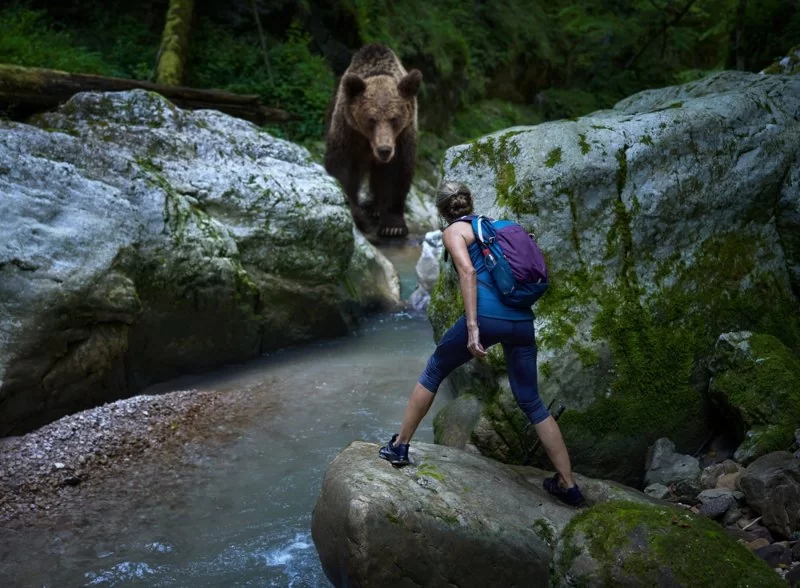Learn how to handle wildlife encounters with bears, snakes, and coyotes. Get practical tips, real-life stories, and expert outdoor safety advice from Pine Cliff Resort.

- 1 - Understanding the Wildlife Risk—why-encounters-happen
- 2 - Bear Encounters—staying-safe-in-the-wilderness
- 3 - Snake Encounters—recognition-and-response
- 4 - Coyote Encounters—urban-and-rural-strategies
- 5 - Real Life Stories—travelers-experiences-and-lessons
- 6 - Expert Tips—outdoor-safety-and-prevention
- 7 - Pine Cliff Resort Support—resources-and-services
1. Understanding the Wildlife Risk
How to Handle Wildlife Encounters: Bears, Snakes & Coyotes begins with awareness. These animals are not out to hunt humans; most encounters happen because of food smells, surprise proximity, or disrupted habitats. Understanding why these meetings occur is the foundation of staying safe outdoors, whether you are hiking deep in the Rockies or camping near suburban trails.
2. Bear Encounters
Bears command respect. Grizzlies and black bears react differently, but both can become defensive if startled. Making noise while hiking reduces surprise. If you see a bear at a distance, remain calm and slowly back away—never run. In rare cases where a bear approaches, using bear spray effectively can stop an escalation. Keeping campsites clean and locking food away are non-negotiables for safety.
2.1 Case Example
In Montana, a group of hikers avoided danger when a black bear wandered into their trail. Because they were talking loudly and traveling in a group, the bear simply veered off into the woods. Their experience reinforces the rule: let wildlife know you’re coming.
3. Snake Encounters
Snakes, especially rattlesnakes in the U.S., often bite only when threatened. Staying on marked paths, watching where you step, and avoiding tall grass are simple yet powerful precautions. If you hear a rattle, freeze, locate the snake, and move away calmly. Do not attempt to handle or kill the snake—it increases your risk.
3.1 Medical Response
If bitten, keep still, keep the limb at or below heart level, and seek immediate medical attention. Popular myths like sucking out venom or applying a tourniquet can worsen outcomes. First aid should focus on slowing venom spread, not dramatic but harmful actions.
4. Coyote Encounters
Coyotes thrive near suburbs and hiking trails, making encounters more common than many expect. If one approaches, stand tall, wave your arms, and make loud noises. Never turn your back or run. If walking a dog, keep it on a short leash; coyotes are opportunistic and may see pets as prey or competition. Respecting their space while asserting your own presence ensures safe coexistence.
4.1 Urban Case Study
In Los Angeles, residents reported coyotes roaming neighborhoods during drought years. Those who secured trash bins and avoided leaving pet food outside saw fewer encounters, highlighting how simple community actions reduce risks.
5. Real Life Stories
A camper in Colorado once shared how a bear entered their camp because food was left in a tent. The lesson was clear: even small lapses can invite big problems. Another traveler recalled hiking in Arizona and spotting a rattlesnake coiled just off the path—their calm retreat prevented a dangerous strike. These personal accounts illustrate how preparation and composure change outcomes.
6. Expert Tips
Outdoor professionals emphasize three principles: prevention, presence, and preparedness. Prevention means securing food, sticking to trails, and traveling in groups. Presence is about making noise, keeping pets close, and observing surroundings. Preparedness includes carrying bear spray in grizzly country, knowing snakebite protocols, and teaching kids how to respond to coyote encounters.
7. Pine Cliff Resort Support
At Pine Cliff Resort, we understand that outdoor adventures should inspire awe, not anxiety. That’s why we provide resources, guides, and gear recommendations to ensure your experiences remain safe and memorable. Whether you’re planning a hike in bear country, a desert walk with rattlesnakes, or a family retreat near coyote habitats, Pine Cliff Resort 【 】 offers trusted services to keep your adventures both thrilling and secure.
The Inn on Piseco Lake
471 Old Piseco Rd, Piseco, NY 12139, USA
Visit Location Page2 Peaks LLC
5911 Landing Ln, Fremont, MI 49412, USA
Visit Location Page